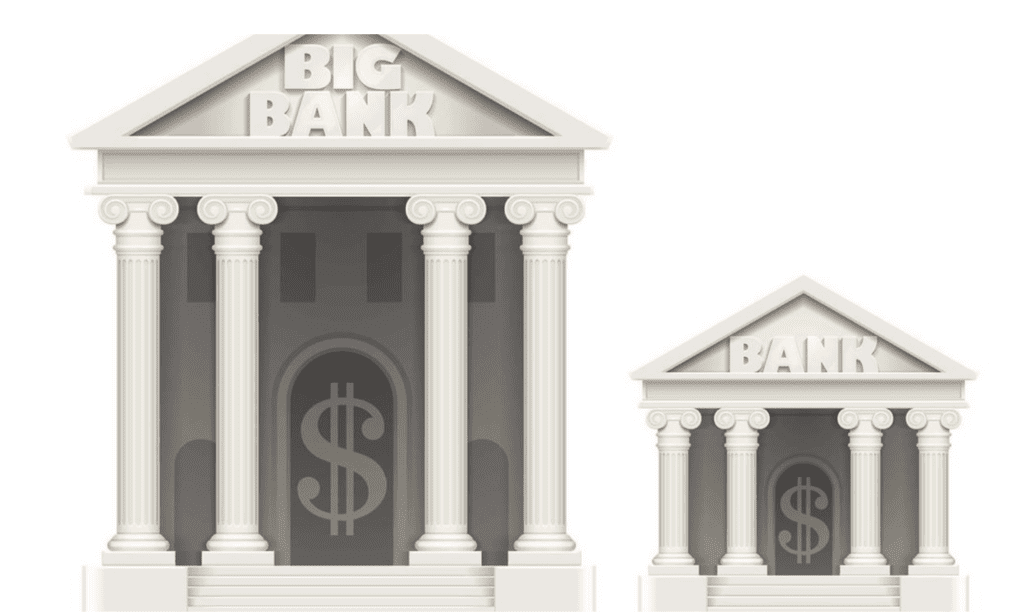Major banks and smaller lenders are all vying for your attention and ultimately your business. When you have decided to start the process of looking at a home loan, we get it the process can be daunting. Homebuyers often find themselves at a crossroads: should they opt for a major bank or consider a smaller lender? This decision is often shrouded in misconceptions and a lack of clear advice which can leave you without a clear path forward so hopefully we can demystify some of these falsehoods. As Sydney mortgage brokers, we are keenly aware of the myths and realities in our industry, and it’s crucial to address these to help you make an informed choice.

Myth 1: Major Banks are Always More Reliable, Smaller Banks are Risky and Could Go Bust
Reality: While major banks have well-established reputations and a significant presence, smaller lenders also offer reliable and secure services. In Australia, all legitimate lenders, including smaller and non-traditional ones, are regulated by the Australian Prudential Regulation Authority (APRA) or the Australian Securities and Investments Commission (ASIC).
This ensures they adhere to strict lending criteria and consumer protection laws, similar to their larger counterparts. Banks don’t go bust in Australia and even if they did, another bank would buy their list of customers, this does not affect your home or home loan significantly.
Myth 2: Smaller Lenders Offer Higher Interest Rates

Reality: There is a common misconception that smaller lenders always have higher interest rates. In fact, they often offer lower rates than major banks to attract customers and gain a larger market share. Competitive rates are available across the board, and sometimes, smaller lenders provide more attractive deals to carve out a market share from their bigger competitors. This means savvy borrowers who shop around might find better rates outside of the traditional big four—ANZ, Commonwealth Bank, NAB, and Westpac.
Myth 3: Loan Approval is Easier with Major Banks
Reality: The loan approval process is not necessarily easier with major banks. It really depends on the product that you are going for and the strength of your application, things such as whether you have a Each bank and lender has its own criteria, which can be equally or less stringent in smaller banks or non-bank lenders. Smaller lenders might even provide more personalised service and flexibility in assessing loan applications, particularly for borrowers with unique circumstances such as self-employed individuals or those with non-traditional income sources.
Myth 4: Major Banks Offer More Comprehensive Services
Reality: Major banks typically provide a wide range of financial services. However, this doesn’t necessarily translate to better mortgage products. Smaller lenders often specialize in mortgages and related products, which can lead to greater expertise and tailored services in home lending. Moreover, with advancements in technology, many smaller lenders provide innovative and user-friendly online banking experiences that rival those of larger banks.
Myth 5: Smaller Lenders Lack Security and Might Go Out of Business
Reality: The fear that smaller lenders are less secure and more prone to going out of business is largely unfounded. Thanks to robust regulatory frameworks in Australia, all financial institutions are required to maintain high levels of capital and meet stringent liquidity conditions. Furthermore, in the unlikely event of a lender failing, the Australian Government guarantees deposits up to $250,000 per depositor, per institution, under the Financial Claims Scheme.
Why Consider a Smaller Lender?
Flexibility and Personalisation: Smaller lenders can often provide more personalised customer service. They may also be more flexible in their lending criteria, which can be a significant advantage for borrowers who might not fit the typical profile preferred by major banks.
Competitive Rates: As mentioned, to stay competitive, many smaller lenders offer lower interest rates or reduced fees compared to major banks. This can result in substantial savings over the life of your loan.
Innovative Products: Often, smaller lenders are quick to adapt to changes in the market and consumer needs, introducing innovative products that might better suit modern borrowers’ requirements.
Tips for Choosing the Right Lender

Compare Offers: Always shop around and compare what different lenders are offering. Use comparison websites, but also consult with a mortgage broker who can provide insights into offers that might not be as widely advertised.
Check the Fine Print: Interest rates aren’t everything. Consider other factors like fees, loan features (such as offset accounts and redraw facilities), and penalties for early repayment.
Seek Advice: A mortgage broker can help navigate the complex landscape of home loans. They have a broad view of the market and can help you find a lender that matches your specific financial situation and needs.
Customer Service: Consider lenders’ customer service records. Sometimes, smaller lenders offer more dedicated support, which can be invaluable during the often stressful home-buying process.
Conclusion
Choosing between a major bank and a smaller lender for your mortgage needs shouldn’t be dictated by common misconceptions. Both types of institutions offer distinct advantages, and the best choice depends on your individual circumstances and needs. By debunking these myths, Australian homebuyers can approach this significant decision with confidence and clarity, equipped to select the lender that truly meets their requirements.
In the dynamic landscape of Australian home lending, understanding your options is more critical than ever. Whether you lean towards a major bank or a smaller lender, the key is to make an informed decision that aligns with your financial goals and provides you with the best terms and service. If you are looking for rated and proven services to assist you with your property buying decision, take a look at OurTop10.com.au and if you wish to discuss your home loan scenario, reach out to us at startnow@sorenfinancial.com or check your serviceability here.
